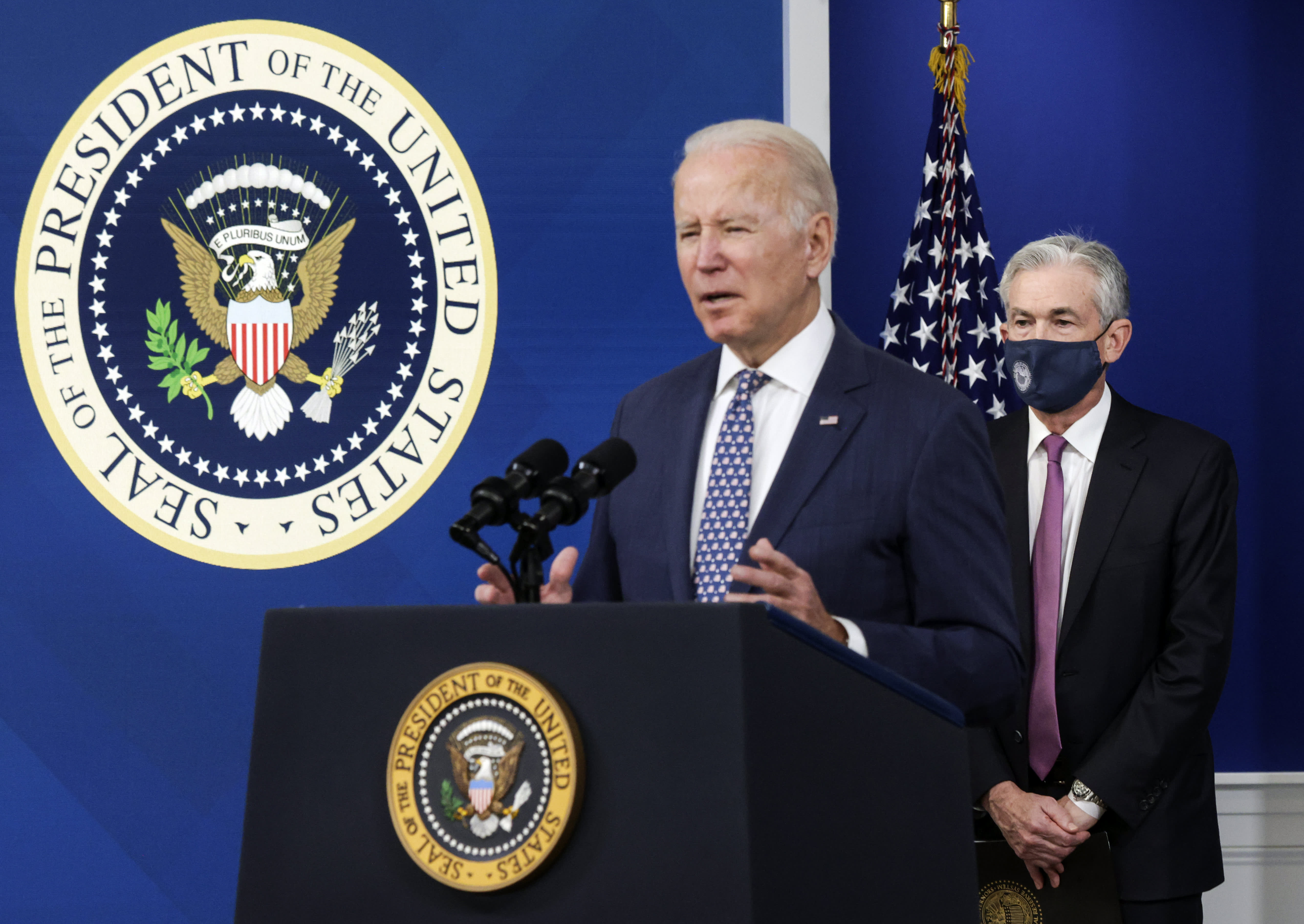Nasdaq dips 1% as bond yields rise, tech falters after Biden picks Powell for second Fed term

Stocks slumped Monday afternoon, reversing an earlier rally that came after President Joe Biden announced he would nominate Chairman Jerome Powell to continue to lead the Federal Reserve, rather than nominating Fed governor Lael Brainard for the post.
The Dow Jones Industrial Average rose just 17.27 points to close at 35,619.25, down from a gain of more than 300 points at session highs. The S&P 500 and Nasdaq Composite fell 0.32% to 4,682.94 and 1.26% to 15,854.76, respectively, after setting intraday record highs.
Bank stocks and Treasury yields moved higher after the White House announced the Fed decision. Shares of JPMorgan rose 2.1%, while Morgan Stanley rose nearly 2.5%. The move higher in rates appeared to take a bite out of some tech stocks, whose future earnings are less attractive to investors when yields are higher.
“I think the drivers on today’s action is more technical, short-week, rotational, dollar strength and interest rates up a little bit,” said David Waddell, chief investment strategist at Waddell and Associates. “I don’t know how much of the reaction today is Powell-specific, but I think Powell overall is positive.”
Powell, a former private equity executive, slashed interest rates to near zero and implemented emergency asset purchases in March 2020 to help backstop the market during the first wave of the Covid-19 pandemic, helping the financial system to remain operational during a sharp slowdown in economic activity. He also led a landmark reevaluation of the Fed’s inflation targeting framework during the Covid crisis.
The move to reappoint Powell assuaged investors worried about switching central bank chiefs while the country’s economy is trying to emerge from the Covid pandemic and battle inflation levels not seen in three decades.
“Continuity will be key during this potentially tricky phase of the recovery where inflation is elevated and sticky, demand growth is strong but cooling, and capital and labor supply is gradually rebounding,” said Greg Daco, chief U.S. economist at Oxford Economics.
Powell’s renomination comes as inflation has exceeded expectations in recent months, leading the Fed to walk back its predictions that the rise in prices that accompanied the reopening of the economy would be “transitory.” Some critics have said the Fed is waiting too long to tighten monetary policy.
The central bank has said it would begin slowing its asset purchases in November, its first major scaling back of its emergency programs from 2020, and indicated that it could accelerate that process early next year.
Brainard, who was seen as Powell’s main competition and was favored by progressives in Washington for her stances on bank regulation and climate change, is being nominated for a vice chair position at the central bank but not to the top regulatory role many had expected.
Powell, a Republican, was first nominated to the Fed board of governors a decade ago by President Barack Obama and ascended to the top job under President Donald Trump. His ties to the Republican Party and previous confirmation for the Fed’s top job were seen by some as reasons that he could be easier to confirm in a closely divided Senate than another candidate.
“I think this is a decent 1-2 combination,” UBS director of floor operations Art Cashin said on “Squawk on the Street.” “I think that’s what they wanted to get, no disruption. I think the market reaction you’re seeing is the market is happy with no disruption.”
Outside of the bank stocks, Moderna was another bright spot for the market. Shares of the biotech firm continued their upward momentum, rising 7.1% after the FDA last week cleared the company’s booster shot for all U.S. adults.
On the downside, the Nasdaq Composite was hurt by declines in stocks such as Netflix and Etsy that spiked over the past two years as the stay-at-home trend accelerated their growth. Those stocks dropped nearly 2.9% and 5.1%, respectively. Shares of Shopify shed 5.6%.
Covid news also weighed on market sentiment, as German Chancellor Angela Merkel warned that the country was seeing a spike of the virus.
The final weeks of the year tend to be a strong seasonal period for Wall Street. Stocks have a track record of posting gains in Thanksgiving week, which will potentially set the stage for a year-end Santa rally.
Since 1950, the last five trading days of November have been traditionally positive, according to Sam Stovall, chief investment strategist at CFRA. Meanwhile, there’s a two-thirds likelihood the market is up on the day before Thanksgiving Day and a 57% chance the day after the holiday, the strategist said.
U.S. markets will be closed Thursday on Thanksgiving Day. The stock market closes early, at 1 p.m. ET, on Friday.
— CNBC’s Patti Domm contributed reporting.




